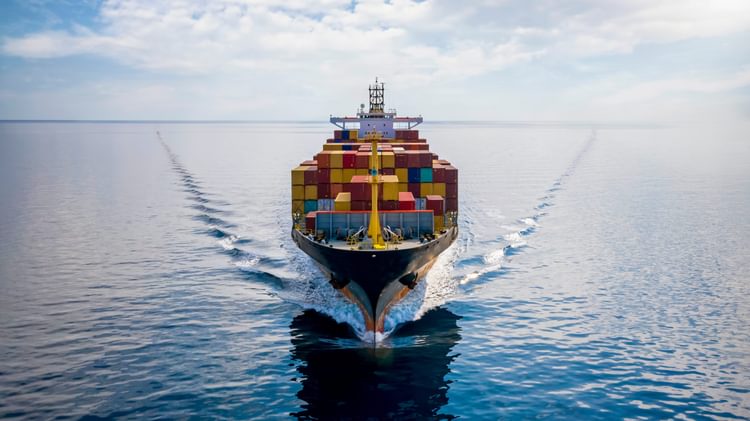A reminder of the shipping industry’s importance in today’s globalised and interconnected economy, was the cargo ship Ever Given remaining wedged between the banks of the Suez Canal for several days in March 2021. This prevented other vessels from passing and cost the global economy an estimated $400 million per hour in delayed trade. It also only compounded the supply chain issues that were already hampering global growth.
With a fleet of over 60,000 large commercial vessels around the world, the shipping industry is vast and growing, accounting for around 80% of the goods transported in international trade – and, as global demand rises, maritime trade is forecast to continue to grow.
However, despite its scale and pivotal role in the economy, shipping has yet to adopt the digitisation seen in the land-based logistics sector. Highly fragmented, often inefficient and largely opaque, the shipping industry is ready for change. Accelerated by technological advances, such as the launch of low earth satellites enabling constant connectivity and communication between ship and shore, it is now set to undergo a period of modernisation.
A rising tide
Though less than 40% of the world’s commercial fleet currently uses even basic software services, this is starting to change as shipyards, ship operators, cargo owners and port authorities come under increasing pressure to manage supply chain challenges and costs.
Governments, regulators, insurers, customers and society as a whole are also demanding change, as concerns around piracy, duty and tax evasion, and the environmental cost of trade, bring the industry under more scrutiny. New environmental regulations, such as those enshrined in the Energy Efficiency Existing Ship Index and the Carbon Intensity Indicator, which come into force in 2023, are good examples. These will require vessels to meet tough emissions standards before entering many ports, with the International Maritime Organisation targeting a minimum 40% reduction in greenhouse gas emissions by 2030.
Digitalisation and the development of software platforms offer a solution to these pressures. “Modern fleets that take advantage of technology will benefit from greater transparency, efficient compliance and customs processing, route optimisation, insurance referencing and so on, strengthening their competitive position,” says Jemma Litkie, Origination Executive at Bowmark Capital.
“These forces are creating an opportunity for entrepreneurial businesses to develop and commercialise solutions that will reshape the shipping industry. As investors, we want to help them get there.”
There is a broad range of businesses providing outsourced digital services that cover the entire value chain. Within this, certain sub-sectors are particularly attractive because they offer the greatest potential for improvement. These include procurement; data and tracking; voyage-optimisation services; and compliance, which itself covers a range of areas from navigation, customs, health and safety and the environment, to staff welfare.
Given the high costs in the shipping industry, there are large budgets for digital and data services and potential for significant savings where these solutions offer improved efficiency. Each vessel costs upwards of $1 million each day to operate and, across the whole fleet, annual spend is around $200 billion – of which half goes on fuel and the rest on labour, consumables and services.
From fragmented to connected
The shipping industry increasingly recognises that it needs to unify systems and information flows between the different market participants. This will drive demand for solutions that replace legacy technology and bring together multiple stakeholders to help them communicate and share data. Digital solutions can help streamline processes and decision-making to reduce the cost of compliance, optimise workflows and asset use, and improve procurement. This could lead to more efficient cargo pricing, help port authorities manage traffic flow more effectively, or streamline the customs reporting process, for example.
The advent of connected ships will also bring much-needed transparency to the sector. Ship operators and cargo owners will be able to see in real-time where their assets are at any moment, and customers will be able to identify and track products through the supply chain.
The power of data insights
As fleets become connected, large, digitalised datasets will streamline the process of managing a voyage from departure through to arrival, while also driving environmental, social and governance improvements.
Voyage optimisation systems, for example, are helping vessels take the best route according to weather conditions and navigational compliance. This minimises delays, reduces fuel consumption and improves crew safety and working conditions. The fuel savings alone are substantial: route optimisation can lessen consumption by 20%, while also lowering carbon emissions in an industry that has historically struggled to reduce its environmental impact.
Data services businesses will help their shipping customers win market share, as journey times reduce and become more predictable. Modernised ships will be able to give precise arrival times, rather than a window spanning several weeks – a big advantage for end customers when it comes to managing supply chains, production planning and estimating order delivery.
Moving towards industry solutions
Technology and data services businesses supplying the shipping industry currently tailor their provision to specific customer needs. This results in shipping companies having to use a variety of tools that are not always compatible with one other. Suppliers that are able to develop and offer integrated or compatible solutions will become the providers of choice.
“There is a real opportunity for point solution providers to consolidate and expand into adjacent areas,” says Julian Masters, Managing Partner at Bowmark. “By developing or acquiring new products or services, these businesses can grow quickly because they offer broader propositions and become embedded in their customers’ operations.”
Exciting times ahead
Digital and data-driven technologies are set to transform shipping, in the same way we have seen in other industries, as Maersk’s particular experience has shown. Having undergone a digital transformation, Maersk is using software platforms and insights gleaned from data to provide its customers with shipment update apps, AI-powered predictive analytics that give accurate arrival times, and technology that monitors not just the whereabouts of cargo, but the conditions inside containers. Its digital journey has enhanced customer service, efficiency and transparency, while lowering insurance premiums and improving environmental standards. Its technology adoption has helped cement its leading market position.
There is huge potential for growth among technology-enabled, software and data service providers in the shipping sector, with European companies leading the way – and the continent’s long history of maritime expertise means it is home to some of the industry’s most pioneering and innovative businesses.
At Bowmark, we have invested in a number of technology and services companies that have helped to transform industries by enabling increased connectivity and data adoption, capitalising on the opportunities available to point solution providers.
SaaS company Pirum, for example, has brought transparency, efficiency and regulatory compliance to the securities finance sector, and we are supporting the business as it expands internationally. Another Bowmark portfolio company, IWSR, demonstrates how data insight can power strong decision-making. By aggregating and verifying non-public sources of information in the $1.5 trillion alcoholic beverage market, IWSR helps its customers to understand key distribution and sales trends. And, in much the same way that ships are becoming connected, cloud and smartphone adoption has created opportunities for field services management business, Totalmobile. Now ranked as one of Ireland’s fastest growing technology businesses, we have supported its organic and acquisitive growth as it builds a range of solutions to meet customers’ needs.
We are keen to partner with ambitious management teams in the shipping technology sector who are looking for strategic support, expertise and investment to help them grow their businesses through new product development and acquisitions. We can also support point service providers in uniting applications across areas such as regulatory compliance, fuel disclosure, routing and employment, to build market-leading companies that will create a sea change in the shipping market.


